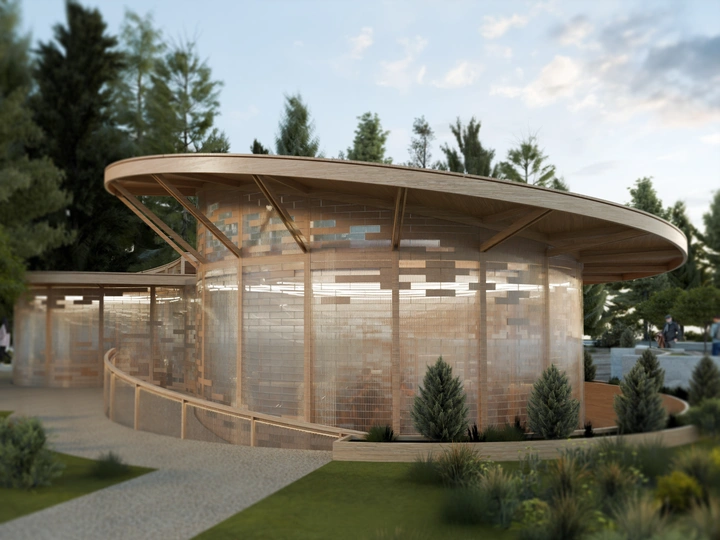Loom: Peja Culture Pavilion

Shpend Pashtriku
We are Sense, an architectural design and consultancy practice based in London, founded in 2022 by Sarah Agill and Shpend Pashtriku. Together, we operate at the intersection of research, experimentation, and strategic design, developing architectural futures through data-driven, responsive, and conscious design practices. Sarah leads the practice’s research direction and integration of experimental design strategies. With prior experience at a leading AJ100 firm in London, she contributed to major projects including the redevelopment of Battersea Power Station. Her work explores how emerging methodologies and technologies can be meaningfully embedded in architectural practice. Shpend specialises in large-scale problem-solving focused on infrastructure, urban development, and early-stage feasibility. Previously, he worked at a top 20 AJ100 firm on projects including the Heathrow Terminal 6 proposal, one of the world’s largest airport schemes. At Sense, he leads on systems thinking, master planning, and computational design strategy. We both hold Master’s degrees from the University of Applied Arts Vienna under Studio_Hani Rashid, where our thesis works addressed speculative futures, from nuclear decay as a regenerative landscape driver to soft robotic assemblies for adaptive urban infrastructure. Our research and design work spans from climate-tuned 3D-printed rammed earth systems to kinetic public installations responding to urban stressors. We contribute to architectural discourse through writing, including essays on the implications of AI in design, authorship, and craft, and participating in design competitions. Recently, our entry into the Peja Culture Pavilion competition was selected as one of the winning entries, for the urban regeneration of a neglected public space, into a vibrant and inclusive public landmark in the heart of the city. Through Sense, we have a shared commitment to bridging the academic, the speculative, and the applied.
Rooted in Kosovo’s evolving architectural identity, Loom draws from the layered cultural influences of the region, acknowledging its resilience and growth. Its design language embodies hybridity, blending local materials and craftsmanship with contemporary approaches, with the aim of delineating a sustainable, high-performing space that can enrich Peja's cultural fabric, both visually and programmatically. At its core, the 15th-century fountain has been reimagined as a centrepiece that leverages the existing height differentiation on site, to create a link between the pavilion and the street level, maximising visibility and engagement. By splitting the historic water flow into two streams, a cascading feature within the pavilion and a street-level fresh-water drinking outlet, the design preserves the existing water flow, while enhancing its presence and utility.
Carefully positioned in relation to Peja’s central square, Loom becomes a marker for the area, its orientation enhancing visibility and interaction. The proposal rebalances the site's existing spatial elements, while preserving and activating as much of the surrounding green area as possible; this is achieved by the integration of tiered seating, an expanded walking path network and a redefined streetscape. Surrounding trees are retained to maintain the park’s historic ecological imprint, while new interventions improve usability and accessibility. Loom’s adaptability is central to its design, supporting exhibitions, performances, and formal or informal gatherings with a flexible open-plan layout and modular furnishings.
Loom aims to be a catalyst for community engagement and cultural exchange, weaving a new thread into Peja’s urban fabric while honouring its cultural, historical, and environmental heritage.